'I must have done a lot of good deeds because of which I was getting the chance to talk to such a mahapurush.'
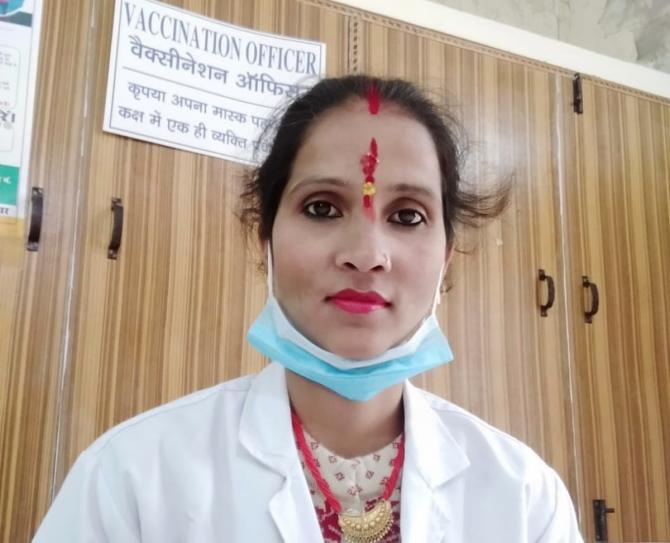
Poonam Nautiyal is a frontline warrior in one of the worst health crises the world has faced.
As a nurse, one of her main responsibilities since March 2020 has been helping people who contracted COVID.
And her biggest challenge, once the vaccine was available, was to convince people to take it.
The fact that she had to traverse through hilly areas to do her job made it even more arduous and dangerous.
Poonam lives and works in Bageshwar, a beautiful Uttarakhand town situated at the confluence of the Sarayu and Gomati rivers. Located at a height of 1,004 metres, the town has religious and historical significance. It is also known for its glaciers, scenic views and temples.
Even though she is a mother to two young children, Poonam did not shy from her professional responsibility.
The 32 year old's dedication to her task helped ensure that her district, Bageshwar, is hundred per cent vaccinated.
Acknowledging Poonam's commitment, Prime Minister Narendra Damodardas Modi spoke to her on a telephone call during a Mann Ki Baat session, which focussed the nation's attention on her hard work.
She is also featured in Azadi Ki Amrit Kahaniyaan -- an inspirational documentary series about seven women achievers released by the Government of India.
Poonam, who was born and educated in Uttarkashi, works at the health sub-centre in Chami. She is the only person at this centre, where she gives children vaccines and looks after pregnant women. "We check them every month during their pregnancy. For delivery, they have to go to a government hospital. I also know how to assist during a delivery."
Looking back at her achievement, Poonam tells Rediff.com's A Ganesh Nadar, "Women are equal to men. Once you decide what you want to do in life, nothing is impossible. When women take a decision, they always reach their goal."
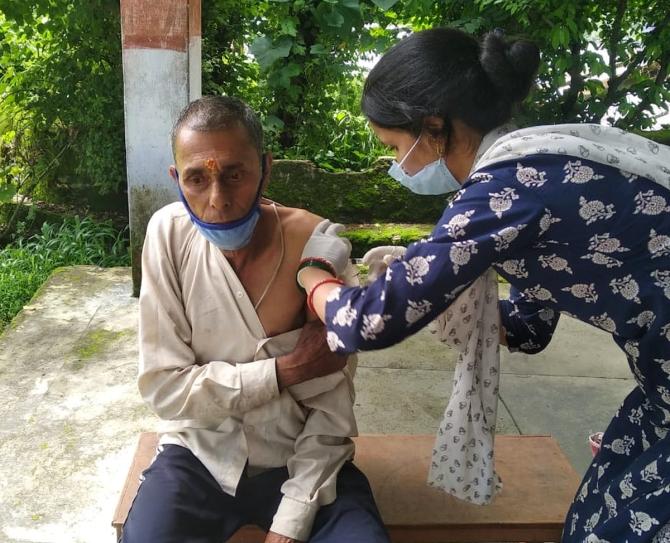
Was it very difficult to achieve 100 per cent vaccination in your district? How did you do it? How long did it take?
It was very difficult. We did it by making lists of those who were left out and following it up.
For some people, I have gone three times to their homes.
The village pradhans used to help me. It took six months to achieve 100 per cent vaccination.
A lot of people hesitated to take the vaccine, particularly in rural areas. How did you overcome this hesitation?
I would tell them I had taken two doses and was fine. I would also tell I have two children.
I would take the village elders with me; that helped. I would also ask our health officials to come and talk to them.
I read that your team and you would walk five to seven kilometres every day to vaccinate people at their homes. And you live in a hilly area!
Sometimes, we would cover five to seven kilometres in a day. Sometimes, it would be eight to 10 kilometres.
As it is a hilly area, it was very tough.
During monsoons, it was worse as everything became slippery.
But I was determined to vaccinate everyone. If they refused on one day, I used to go again on another day.
I used to tell them to think about their family.
Did many people get COVID-19 in your area? Did they recover at home or were they hospitalised?
Very few people were infected in our area.
We had to admit only one or two people in the hospital.
What were the difficulties you faced while doing your job during the pandemic? What are the safety precautions you took? Did you feel anxious when you returned home in the evening as you have young children?
The lockdown was announced on March 24, 2020.
I was on duty.
We had to check those who came from outside the district for fever and other symptoms.
If they had any symptoms, we would send them for a COVID test at the primary healthcare centre and then to a doctor.
Every day, when I reached home, I would be so worried. I would go straight to the bathroom where I would wash and sanitise my clothes and have a bath before meeting my children. After doing all this, I would wait for an hour before going near my children.
They also knew they had to stay away from mummy until this time.
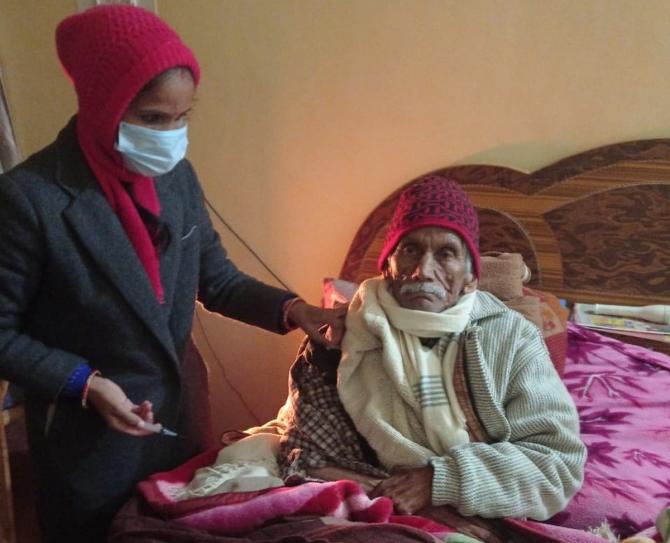
What did you tell Prime Minister Modi when he called you?
I got a call from the prime minister's office.
They told me to be to come to the district chief medical officer's office the next day as the prime minister wanted to talk to me.
I am only an ANM (trained in auxiliary nurse midwifery); I could not believe that the prime minister wanted to talk to me. I must have done a lot of good deeds because of which I was getting the chance to talk to such a mahapurush (great man).
Though I was very nervous, I did not prepare anything. I decided I would just answer his questions.
He said, 'Hello Poonamji.' He asked me to introduce myself and then asked about my work. He asked me about how I did my job.
I told him about the roadblocks during the rains.
I told him about how we made lists of those who had not taken the vaccine and then went house-to-house to convince them.
We chatted for about 15 minutes. The conversation was about my work.
How has life changed since the prime minister spoke to you?
It has made a big change in my life. More people recognise me now.
Many people take selfies with me.
The people of Bageshwar say that the entire district is proud of me because the prime minister talked to me.
When I go to my children's school, children say that they saw my documentary on TV.
Children want to work like me. When I am walking on the road, children sometimes address me as the 'ma'am who gives vaccination'.
When and why did you decide to become a nurse?
My father was in the army and I wanted to join the army too.
But my dad wanted me to become a doctor.
We are a middle-class family and could not afford the fee for a medical education, so I became a nurse.
I did the ANM course at a government college; it is an 18-month course.
Was it difficult to get a government job?
Nothing is easy.
I worked for five-and-a-half years on contract with the National Health Mission.
After that, I applied and got this job/
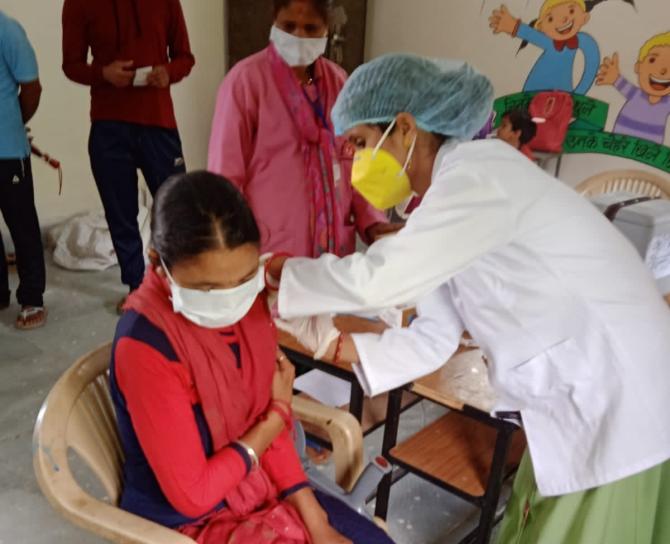
What are your future plans?
I want to serve the people.
What is your advice to young girls who want to join nursing?
It is a good career option. It is a matter of pride that you can serve the people.
How does it feel to have a documentary made about you?
I felt very happy.
I never thought my family and I would go to Mumbai.
The documentary was made in Mumbai.
We were there for four days. We spent one day going around the city. We enjoyed the tour.
You are an inspiration to many. Who inspired you?
My inspiration is my dad who wanted to make me a doctor.
He has passed away, but I'm sure that, wherever he is, he must be happy to see me now.
What is your message to the youth of this country?
Women are equal to men. Once you decide what you want to do in life, nothing is impossible.
When women take a decision, they always reach their goal.
My husband has always been very supportive of me and my work.
Feature Presentation: Rajesh Alva/Rediff.com








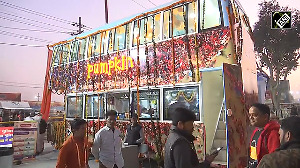
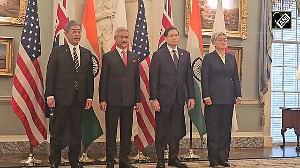

 © 2025
© 2025